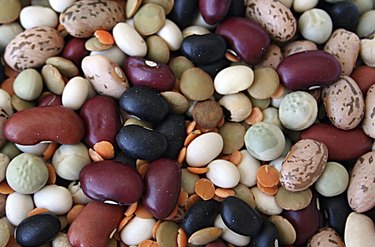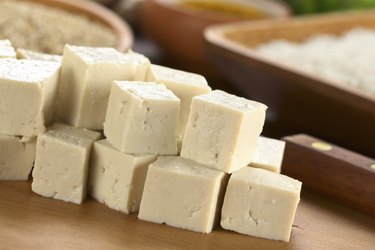
A low glycemic diet can be compatible with your vegetarian eating plan if you emphasize complex carbohydrates that keep your blood sugar stable. Many vegetables, fruits, whole grains and legumes have a low to moderate value on the glycemic index, or GI, a scale that ranks the effects of carbohydrate-containing foods on your blood sugar. By focusing on these foods, along with low-fat proteins, you can plan healthy vegetarian meals with an overall low glycemic value.
Low Glycemic Guidelines
Video of the Day

A low glycemic diet uses GI to rate foods on a scale of 1 to 100 depending on their effect on your blood sugar. Vegetarians can eat foods with a high GI value, such as potatoes or bread, as long as the overall GI value of the meal is low. Non-meat foods that contain mostly protein, such as tofu, nuts and eggs, do not have a GI value because the effect of protein on your blood sugar is too low to be evaluated. Combining a protein with complex carbohydrates at the same meal will not increase the meal's overall GI value.
Video of the Day
Low-GI Carbohydrates

When planning low-GI vegetarian meals, choose complex carbohydrates that have a low to moderate GI value. Non-starchy, leafy vegetables such as spinach or kale have such low amounts of digestible carbohydrates that their GI value can't be tested. However, starchy vegetables, such as white potatoes and sweet potatoes, have a moderate to high GI value. Pasta has a low to moderate GI value because its starch molecules are encased in protein, which slows their conversion into glucose.
Benefits

A vegetarian diet that's low in animal fats and rich in low-GI complex carbs may help you manage your blood sugar, control your blood pressure, and avoid high cholesterol and heart disease, according to an article published in the "American Journal of Clinical Nutrition" in 2003. Because vegetarian diets offer high amounts of bulk in the form of vegetables, legumes and whole grains, these diets allow you to feel full with fewer calories and can help you maintain a healthy weight.
Protein Options

Legumes are a low-GI, high-fiber option for vegetarian diets. Navy beans, soybeans, chickpeas, pinto beans and other legumes contain soluble fiber, a form of fiber that turns into a gel in water and slows the digestion of carbohydrates. This delays the conversion of carbs into glucose and stabilizes your blood sugar. Tofu and nuts offer protein options for vegetarians who exclude eggs and dairy foods, while eggs, cheese and dairy products provide alternatives for vegetarians who include some animal-based foods in their diet.
Considerations

Although the glycemic index may be a useful tool for estimating the effects of foods on your blood sugar, it doesn't provide information about a food's nutritional value. Some protein-rich vegetarian foods, such as hard cheeses, have no GI value, but are high in saturated fat or sodium. The American Heart Association advises that vegetarians who eat eggs should not eat more than one egg per day to avoid exceeding the recommended limit of 300 mg of cholesterol.